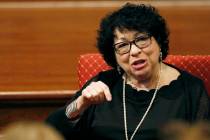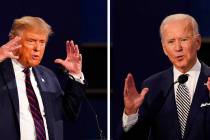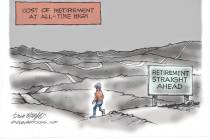CDC serves up more ignorant alcohol advice for women
Are you an adult woman capable of carrying a child? If so, the Centers for Disease Control and Prevention has some advice for you: Don't drink any alcohol unless you're on birth control.
Admittedly, the CDC does have good intentions with its recommendations. The agency wants to prevent fetal alcohol spectrum disorders — serious health problems that can affect a baby's development and are preventable by limiting alcohol during pregnancy. However, achieving this worthy public health goal shouldn't require women to suddenly stop drinking and having sex. And expecting women to take that advice is utterly unrealistic.
According to a new report from the CDC, "an estimated 3.3 million women between the ages of 15 and 44 are at risk of exposing their developing baby to alcohol because they are drinking, sexually active, and not using birth control to prevent pregnancy." To translate: fertile women could have a baby at any time; ladies, either put down your light beer or stop having sex.
While medical bodies, including the American Academy of Pediatrics, say "no amount of alcohol is safe during pregnancy," many individual doctors suggest a glass of wine or two during pregnancy isn't an issue. University of Chicago economist Emily Oster reviewed hundreds of academic studies and ignited a firestorm when she authored a book arguing that occasional drinking during pregnancy (1-2 drinks per week in the first trimester, 1 daily thereafter) isn't problematic.
Unsurprisingly, women across the U.S. had a strong reaction to the CDC's push for abstinence, calling it "paternalistic," "condescending" and "preachy." But this advice to women is just the latest in a long line of anti-alcohol advice pushed by the government's health nanny.
Every year, the CDC generates splashy headlines about how "excessive drinking" is costing our economy billions of dollars each year and that "one in three adults drinks excessively."
So are we really a nation of problem drinkers?
Under the CDC's ridiculously broad definition of "excessive drinking," the answer is yes. While the CDC and U.S. Dietary Guidelines define "moderate drinking" as a woman drinking up to seven drinks per week (or one per day), a woman is suddenly an "excessive drinker" if she has eight drinks in a week (just one extra cocktail on Saturday night).
The CDC gives men a bit more leeway before labeling them problem drinkers. Up to two drinks per day (14 per week) for men is "moderate drinking," but one extra drink sends them into the "excessive" category.
There is a clear difference between an adult who enjoys two glasses of wine with dinner and one who chronically consumes several bottles. However, targeting policy recommendations to those with alcohol abuse problems isn't in the CDC's wheelhouse.
The CDC advocates for higher alcohol taxes, though the National Institute on Alcohol Abuse and Alcoholism reports that alcohol tax increases had no effect on the 5 percent of consumers who are the heaviest drinkers. Instead, higher prices encourage moderate drinkers to cut back and heavy drinkers to switch to cheaper brands.
The agency also recommends states lower the legal blood alcohol concentration limit for driving from .08 to .05 percent. The average BAC for a drunk driver involved in a fatal crash is .15 — nearly twice the current legal limit. If setting the limit at .08 hasn't stopped these heavily intoxicated drivers from getting behind the wheel, .05 is unlikely to succeed. Even Mothers Against Drunk Driving doesn't think .05 is the answer.
The more the CDC pushes these prohibitionist and paternalistic policies, the less the American public is going to take the agency's advice seriously. It's time for the CDC to turn its focus back to the problem drinkers who pose the greatest threat to public health.
— Sarah Longwell is managing director of the American Beverage Institute.























